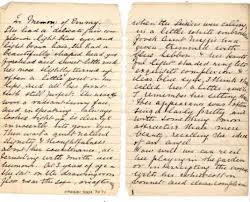I love Pauline Roche, she’s the sort of relation everyone should have in their family history. Her story is so bizarre that it reads like a novel.
She is John Roche’s great-granddaughter, and in an unintended way, one of the major beneficiaries of his will, at her marriage, she was said to have about £7,000 (roughly £ 7.5m today). So to set her in context; Pauline Roche is Ernest O’Bryen‘s first cousin on her mother’s side. Her mother Jane is John Roche O’Bryen‘s eldest sister. She is also his second cousin on her father’s side, because William Roche, Pauline’s father is their ( Jane and John Roche O’Bryen) first cousin once removed.

Pauline was born in Rome in 1835, and her father died the same year, when she was three months old. Her mother died the following year (1836) when she was eleven months old. She becomes John Roche O’Bryen’s ward for not entirely clear reasons.
However, JROB is her uncle, and only he, and Jane O’Bryen were Catholic. All their remaining siblings are Church of Ireland. JROB and Jane/William Roche are the only O’Bryen beneficiaries of John Roche’s estate. It is also reasonable to consider other factors. In 1836, John Roche O’Bryen is married with two young children, Emily who is four, and Henry (the future Mgr O’Bryen) who is almost exactly the same age as Pauline. None of the other O’Bryen siblings have established families, Robert marries that year, and Stephen the year after. 1836 is also the year that Henry Hewitt O’Bryen Senior dies, so Pauline’s grandmother Mary O’Bryen is a recent widow.
It may also be as simple as the fact that John Roche O’Bryen is almost twice as rich as all his remaining siblings, and mother put together. Robert, Stephen, and Mary O’Bryen were the main beneficiaries from their father’s will, but the majority of their inheritance was from their parents’ £4,000 marriage settlement, which Mary (Roche) O’Bryen was still benefitting from until her death in 1852; whereas JROB had inherited £ 10,000 from his grandfather in 1829. Well, technically he received the income from the money in 4% stock, with his children being the ultimate beneficiaries of the capital on his death, with a number of caveats regarding him receiving the full benefits until he was twenty five, or married. In part, that might explain, his marriage at the age of twenty one, in Bordeaux. Wealth comparisons are notoriously complicated, the measuring worth website can be useful because it provides a range of calculations and comparisons depending on what you are looking for. Using their income value calculation, JROB’s annual income was, a present day equivalent of, over £ 500,000 a year.
Anyway, for what ever reasons, Pauline is part of the O’Bryen family, and is shown living with them in Bristol in 1841, and again in 1851.


However in 1847, James Joseph Roche dies, triggering a dispute in the family that culminates in Roche v. O’Brien which goes through the courts in 1848, and 1849. James Joseph Roche was the main beneficiary of John Roche’s will from 1826. It is quite clear that John Roche was attempting to build a Roche dynasty to maintain the family name, and the house that he had built for himself (Aghada House). James Joseph Roche, who inherited Aghada from John Roche, married Catherine Callaghan. The marriage itself has all the appearances of being at least in part a commercial link between two merchant families. John Roche’s will refers to his contribution of £4,000 to a marriage settlement in 1821. Coincidently, the same amount, that he contributed to his own daughter’s marriage settlement in 1807. John Roche “amassed great wealth during the French wars”, and Daniel Callaghan Senior was, “one of the most enterprising and successful merchants of Cork”. Pauline as a minor of 12 or 13, is a party to the case. Aghada House, and the land was sold in 1853 in the Encumbered Estates Court, with Pauline Roche listed ex parte.
This is where the story gets much, much, more interesting. In 1854, aged about 19, Pauline runs away from home in Bristol, crosses the Irish Sea to her uncle Robert O’Bryen in Cork, and goes to court seeking a change of guardian. It all sounds relatively straightforward, and even better it’s all over the papers, well some of them anyway, The Daily News, in London, the Dublin Evening Post, The Liverpool Mercury and Supplement, and The Tralee Chronicle.
The Daily News called it a “A singular minor case, involving charges of cruelty against a guardian”, The Dublin Evening Post said it was an “EXTRAORDINARY CASE…..the question at present before the court being whether the guardian of the minor should pay the costs of proceedings consequent upon an alleged system of cruelty practised towards her.” The Liverpool Mercury headlined the story the “PERSECUTION OF A WARD IN CHANCERY” and the Tralee Chronicle said “The general nature of the charge against the late guardian appeared to be this – that although he was allowed from 1850 a maintenance of £ 130 per annum, this young lady was not properly fed – had been most cruelly treated and subjected to personal violence.”
Pauline Roche’s maintenance allowance of £ 130 per annum, was a huge sum of money. In modern day terms, it is about £ 180,000 a year. Not bad for a teenager, and possibly quite irritating to your uncle that you are entitled to an equivalent of about thirty per cent of the O’Bryen household income. JROB’s income from the interest on capital is about £ 500,000 p.a.
The reporting is amusing, and shows the Victorian press weren’t so different from todays. The Dublin Evening Post manages to muddle up which uncle Pauline runs off to, and the Tralee Chronicle not only gets the uncles wrong, but also has Pauline being mistreated by ” Dr Robert O’Brien, of Belfast”.
However, the gist of the story is still Pauline wants a new guardian, and she says she’s been mistreated. Actually, if her story is true, it’s much worse than that. According to the Daily News, “Miss Roche was a young lady whose constitution was delicate, and therefore, it was contended she required great care and attention, instead of which she was provided with bad food, bad clothes, and was deprived of such necessaries as sugar and butter; she was likewise deprived of horse exercise, which was indispensable to her health. A pony, the bequest of a dying patient…….” – I particularly like the fact that this was a gift from a dying patient – “was given to her; and when she was deprived of this, a carriage horse was procured, which kicked her off his back, and she refused ever again to mount him. She also complained that upon two occasions he (guardian) beat her severely – that he made her a housekeeper and governess to the younger children, that he led her to believe she was dependent upon his benevolence; and further, that she was not permitted to dine with him and his wife, but sent down to the kitchen with the children and the servants.”
 The Dublin Evening Post told us ” she was provided with bad food, bad clothes, and was deprived of such necessaries as sugar and butter; she was likewise deprived of horse exercises which was indispensable to her health………..” and in his answer to the allegations.. “Dr O’Bryen replied that he had treated his niece with kindness – that her preservation from consumption was solely ascribable to his judicious and skilful treatment – that he caused her to be well educated, had given her many accomplishments and a horse to ride, which was not a carriage horse but an excellent lady’s horse – that she upon two occasions told him untruths which required correction, and that he would have punished his own children much more severely.”
The Dublin Evening Post told us ” she was provided with bad food, bad clothes, and was deprived of such necessaries as sugar and butter; she was likewise deprived of horse exercises which was indispensable to her health………..” and in his answer to the allegations.. “Dr O’Bryen replied that he had treated his niece with kindness – that her preservation from consumption was solely ascribable to his judicious and skilful treatment – that he caused her to be well educated, had given her many accomplishments and a horse to ride, which was not a carriage horse but an excellent lady’s horse – that she upon two occasions told him untruths which required correction, and that he would have punished his own children much more severely.”
And in a fairly un-subtle piece of character assassination; “ It was likewise contended that she would have better consulted her own respectability and displayed better taste, if she had abstained from taking such proceedings against her uncle and guardian with whom she had been for so many years.”
The Dublin Evening Post continues, and the story just gets worse. From the reporting, the (Irish) Master of the Rolls, is clearly on Pauline’s side. He “said that a petition was presented by Mr Orpin, the solicitor for the minor, for the purpose of removing the late guardian for misconduct. His lordship made an order on that occasion to the effect that the minor should reside within the jurisdiction of the court, which was indirectly removing her from the protection of the late guardian.”
It continued “The general nature of the charge against the late guardian appeared to be this – that although he was allowed from 1850 a maintenance of £139 per annum, this young lady was not properly clothed – that she had not been properly fed – had been most cruelly treated and subjected to personal violence. Six or seven years ago she was actually driven to run away, which of course she had since been obliged to repent, and even if she did get education it was the education of a poor relation of the family. The governess who was employed to educate her cousins swore, as he (the Master of the Rolls) understood, that if the minor did get education it was at the expense of the guardian, and that she gave her instructions as a matter of charity. This young lady was obliged to run away, and conceal herself in a neighbouring village, and no person who looked at the subsequent transactions could entertain a doubt but that she had been treated with cruelty. It was sworn by Mr Sweeny, a solicitor of the court, that he was ashamed to walk with her she was so badly dressed.”
The mauling from the Master of the Rolls continued, ” The Master found, and it was actually admitted by the respondent ( JROB) , that he told her on one occasion, her father had left her nothing; that she would be in the poorhouse but for his generosity. He (the Master of the Rolls) adverted to this circumstance for the purpose of asking this gentleman who struck this young lady, in delicate health, with a horsewhip for having told him, as he represented an untruth – what punishment he deserved for having told her the falsehood that her father had left her nothing?”
 And it just goes on, and on.. ” On the morning of the 4th of May 1854, the transaction took place which led her to write the first letter to her uncle who was now her guardian. It appeared that one of her cousins brought her a piece of leather which the child had got in the study of the late guardian, but not telling her anything about it she asked her to cover a ball, and she did so. He interrogated her on the subject, and having denied she took the leather, he took his horsewhip and struck this delicate young lady a blow which left a severe mark on her back to the present day. His lordship then read the letter of the minor to her uncle in Cork inquiring about her father’s circumstances, and complaining bitterly of the treatment she had received, and stating that, though she was then nineteen years of age, she had no pocket money except a little which had been supplied by friends. His lordship continued to say that the facts contained in that letter were corroborated by the statements of the guardian himself. On another occasion, the minor being in the room with her uncle, his powder-flask was mislaid, and being naturally anxious about it, as there were younger children living in the house, he asked this young lady respecting it, but she laughed at his anxiety, and he struck her a blow, according to his own version, with his open hand, but after the blow of the horsewhip, he (the Master of the Rolls) was inclined to think it was with his fist as she represented.”
And it just goes on, and on.. ” On the morning of the 4th of May 1854, the transaction took place which led her to write the first letter to her uncle who was now her guardian. It appeared that one of her cousins brought her a piece of leather which the child had got in the study of the late guardian, but not telling her anything about it she asked her to cover a ball, and she did so. He interrogated her on the subject, and having denied she took the leather, he took his horsewhip and struck this delicate young lady a blow which left a severe mark on her back to the present day. His lordship then read the letter of the minor to her uncle in Cork inquiring about her father’s circumstances, and complaining bitterly of the treatment she had received, and stating that, though she was then nineteen years of age, she had no pocket money except a little which had been supplied by friends. His lordship continued to say that the facts contained in that letter were corroborated by the statements of the guardian himself. On another occasion, the minor being in the room with her uncle, his powder-flask was mislaid, and being naturally anxious about it, as there were younger children living in the house, he asked this young lady respecting it, but she laughed at his anxiety, and he struck her a blow, according to his own version, with his open hand, but after the blow of the horsewhip, he (the Master of the Rolls) was inclined to think it was with his fist as she represented.”
So, a doctor in Bristol, in his mid-forties, who admitted in court that “she, upon two occasions, told him untruths which required correction” which seems to have been using his horse whip, and fists, and that ” he would have punished his own children much more severely.” basically attacks a teenage girl.
Now the Dublin Evening Post continues in the same vein, ” The general nature of the charge against the late guardian appeared to be this – that although he was allowed from 1850 a maintenance of £ 130 per annum, this young lady was not properly fed – had been most cruelly treated and subjected to personal violence. This young lady was obliged to run away, and conceal herself in a neighbouring village, and no person who looked at the subsequent transactions could entertain a doubt that she had been treated with cruelty. It was perfectly clear that this young lady had been kept ignorant up to a late period of the state of her circumstances.”
And the catalogue of criticism from the Master of the Rolls just continues, and continues. More from the Dublin Evening Post:
- “Six or seven years ago she was actually driven to run away, which of course she had since been obliged to repent,”
- “The Master (of the Rolls)…..found that the minor, who was in her nineteenth year, dined with the servants.”
- “The Master (of the Rolls) found, and it was actually admitted by the respondent, that he told her on one occasion her father had left her nothing; that she would be in the poorhouse but for his generosity.”
- “She got half a pound of butter for a week, but no sugar or any of those matters which were considered by mere menials to be the necessaries of life.”
- “On the 9th of October a letter was written, by the dictation of this young lady, giving the most exaggerated account of her happiness, and this was alleged to be her voluntary act, though by the same post Mr Orpin (her solicitor) received a letter from her stating that she was under the influence of her aunt when she wrote it.”
And finally, though they get the uncles the wrong way round:
- “Ultimately, in the absence of her uncle, and late guardian, and apprehending his anger when he returned, she left the house and went to reside with her uncle John (sic) in Cork, her present guardian. A circumstance occurred when Mr Robert O’Bryen (sic) went to recover possession of his ward, which corroborated strongly the minor’s statement. When he was passing through Cork, she was looking out of the window and fainted upon seeing him – so much frightened was she at his very appearance.”
There is a full transcript of the newspaper reports, here. JROB’s defence of his behaviour is quite extraordinary,and also included in the transcripts. It is something I’ll come back to in another post. It is quite clearly carefully planned, and done with the support of the editor of the Bristol Mercury. The italics for inference are printed in the paper, so it is definitely planned with some care, and not just a letter to the editor.
It’s also a classic example of bad PR probably making things worse. In a taster of things to come, JROB starts his letter with the Latin tag “Audi alterum partem” best translated as “let the other side be heard as well”, and finishes with “Fiat Justitia, ruat caelum” – “Let justice be done though the heavens fall”. This was most famously used by Lord Mansfield in 1772 in the first major English case on the legality of slavery.
So pompous, self-serving, and an astonishing attack in print on a teenager. Still, greater consideration of that is for another time.
Back to Pauline; she stayed in Ireland, and was married two years later in 1857, aged about 21. According to the “Barrymore Records of the Barrys of County Cork” “Pauline Roche, (is the) only child of William Roche, son of Lawrence Roche, whose brother, John Roche, amassed great wealth during the French wars, and built Aghada House. John Roche’s only daughter, married to ” O’Brien, (sic) [Henry Hewitt O’Bryen] of Whitepoint, Queenstown, J.P., left a daughter, who married her cousin, William Roche, and with her husband died shortly after the birth of their only daughter, Pauline, who was entrusted to the guardianship of her uncle, Dr. O’Brien, of Liverpool, and at marriage had a fortune of £ 7,000.”
Pauline Roche married William Henry Barry, of Ballyadam, who was described as a gentleman. He was also a Justice of the Peace. William was his uncle Henry’s heir and was for many years postmaster of Cork. The Barrys of Ballyadam were part of the vast, interconnected Barry family in Cork. William Henry was the grandson of William Barry (1757 -1824) , of Rockville, Carrigtwohill, in county Cork. Various branches of the Barry family trace themselves back to the Anglo-Norman invasion of Ireland in the C12th.
In a slightly curious irony, the Master of the Rolls who sat on Pauline Roche’s case in 1855 ( Sir Thomas Berry Cusack-Smith) married into the Smith Barry family, as did Pauline and William’s daughter Mary, making him and Louisa Cusack-Smith, Mary Barry’s husband’s great-uncle and aunt. It’s a small, small world…
Pauline and William Henry Barry had seven children, including William Gerard Barry – the Irish painter, Mary who married into the Smith Barry family of Ballyedmond, and Edith, whose second husband, William Babtie won a Victoria Cross in the Boer War.
Pauline appears to have died in 1894, and various of her children were still living at Ballyadam almost twenty years later.
One of the best stories I’ve read recently! Almost reads like a Bronte novel!
Tony
Ta again.
I’ll re-post JR’s reply to his local paper in Bristol about the Pauline Roche case.
It’s a classic example of bad PR, and actually very funny.
Very much – when in a hole, stop digging. In his case, with a JCB……
Will
Reblogged this on Midleton with 1 'd' and commented:
Although it reads like a novel, Pauline Roche’s tale is not a work of fiction by the Bronte sisters but a riveting tale about a feisty young lady righting a long standing wrong done to her. It is a tale that links Aghada Hall to Rome, and to Ballyadam, near Lisgoold. Here it is told by William Grey in his blog.